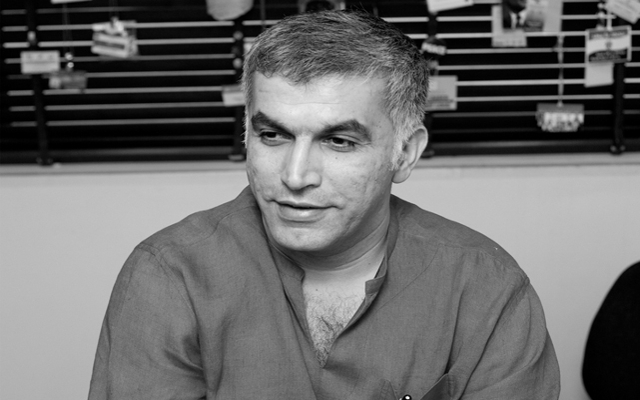On 13 June 2016 at approximately 5:00am, security forces entered the home of Nabeel Rajab, one of Bahrain’s most prominent human rights defenders, and arrested him. Security forces carried Rajab away as his 14-year-old daughter trailed behind him, defiantly urging her father to “stay steadfast”. More than one hundred days later, Rajab is sitting in solitary confinement awaiting his twice-postponed trial to commence on 6 October. He is facing up to 15 years in prison for “spreading false or malicious news, statements, or rumors,” “insulting a statutory body,” and “offending a foreign country.”
This is not Rajab’s first round of reprisals from the government for his work defending human rights. Since 2001 he has been among the most active advocates for democracy and dignity in the country, founding the Bahrain Human Rights Society, Bahrain Center for Human Rights (BCHR), and Migrant Workers Protection Society. In 2011, Rajab joined the hundreds of thousands of Bahrainis who assembled in peaceful protest against the systematic discrimination. For his involvement in the movement, security forces arrested, beat, and detained Nabeel.
Since 2011, the Bahraini government has repeatedly targeted Nabeel for his work. Nabeel has spent years in prison on charges all related to his human rights activism. In one instance in 2012, Bahraini authorities arrested Nabeel at the airport following his return to the kingdom. The government brought forth a charge related to comments published by Nabeel on Twitter criticizing the Ministry of Interior. Authorities harassed Nabeel with arrests and detainments a number of times in the summer of 2012, finally sentencing him to two years in prison in December. Rajab served his full term and authorities released him on 24 May 2014. However, the arrests and targeting did not end as the government continued to bring new charges over the years.
In regards to Nabeel’s most recent arrest, the authorities have charged him with “insulting a statutory body” and “spreading rumors during a time of war.” The charges related specifically to tweets he wrote criticizing the use of torture in Bahrain’s Jaw Prison and calling for an end to the war in Yemen.
On 4 September, while awaiting his trial, Nabeel wrote an open letter published in the New York Times calling on the U.S. government to resolve the conflict in Yemen and press for the release of political prisoners in Bahrain. The next day, Bahraini officials announced that he had been additionally charged with “deliberate dissemination of false news and spreading tendentious rumors that the prestige of the state.” The charge, which clearly resulted from the letter, incited a scathing response article by the editorial board of the New York Times. In the article, the times joined dozens of NGOs, international officials, and the US State Department in calling for Nabeel’s immediate and unconditional release.
There have been reports that Rajab is also being subjected to mistreatment and psychological abuse while in detention. He is currently being held at the East Riffa police station in solitary confinement, which a 2011 report by the UN determined to be a form of torture. The last time he was kept at East Riffa, he had to be rushed to a hospital with breathing difficulties, an irregular heartbeat and a weakened immune system. Rajab’s holding cell is unsanitary, and when he asks for anything from the guards they respond by screaming at him. Clothes and toiletries delivered by his family have been covered in mud before he is allowed to have them. This degree of attention and harassment is unprecedented as usually when a suspect is awaiting trial they are held in a larger general population facility.
Nabeel Rajab’s arrest and impending prosecution represent another item on the Bahrain government’s agenda to stifle free speech. The threats he received in 2015 by the official who would eventually arrest him are evidence that so long as Rajab remains an ember of freedom, the country’s leadership insists on stamping him out. This aggression is a clear violation of the freedoms guaranteed by the International Convention on Civil and Political Rights (ICCPR), to which Bahrain is a signatory. Rajab’s mistreatment is also a violation of the ICCPR, as well as the Convention Against Torture (CAT), and the International Convention for Economic Social and Cultural rights (ICESCR). In order to comply with its commitments under international law, the Government of Bahrain must immediately release Nabeel and provide him with an enforceable right to compensation for his imprisonment and abuse.
Graham Pough is an Advocacy Intern at ADHRB.





